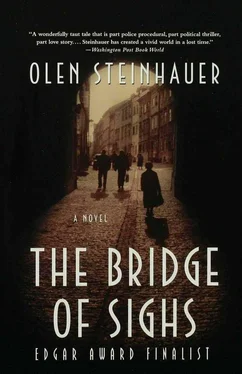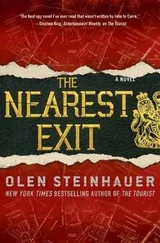Olen Steinhauer - The Bridge of Sights
Здесь есть возможность читать онлайн «Olen Steinhauer - The Bridge of Sights» весь текст электронной книги совершенно бесплатно (целиком полную версию без сокращений). В некоторых случаях можно слушать аудио, скачать через торрент в формате fb2 и присутствует краткое содержание. Жанр: Политический детектив, на английском языке. Описание произведения, (предисловие) а так же отзывы посетителей доступны на портале библиотеки ЛибКат.
- Название:The Bridge of Sights
- Автор:
- Жанр:
- Год:неизвестен
- ISBN:нет данных
- Рейтинг книги:3 / 5. Голосов: 1
-
Избранное:Добавить в избранное
- Отзывы:
-
Ваша оценка:
- 60
- 1
- 2
- 3
- 4
- 5
The Bridge of Sights: краткое содержание, описание и аннотация
Предлагаем к чтению аннотацию, описание, краткое содержание или предисловие (зависит от того, что написал сам автор книги «The Bridge of Sights»). Если вы не нашли необходимую информацию о книге — напишите в комментариях, мы постараемся отыскать её.
The Bridge of Sights — читать онлайн бесплатно полную книгу (весь текст) целиком
Ниже представлен текст книги, разбитый по страницам. Система сохранения места последней прочитанной страницы, позволяет с удобством читать онлайн бесплатно книгу «The Bridge of Sights», без необходимости каждый раз заново искать на чём Вы остановились. Поставьте закладку, и сможете в любой момент перейти на страницу, на которой закончили чтение.
Интервал:
Закладка:
Olen Steinhauer
The Bridge of Sights
CHAPTER ONE
The greeting was in his desk, the center drawer: a piece of fish- stained cardboard with a clumsily drawn stick figure. It had a circular head and an X for each eye. A fat knife separated the head from its stick body. The speech balloon said, We’re on to you.
His chair wobbled insecurely beneath him.
Emil inhaled slowly, evenly. He sat in the center of the large, stale-smelling office, between two columns, and on the far wall two high, open windows did nothing to freshen the air. His tight suit constricted him as he stared above the others’ heads at the clock on the yellow wall. It was the dirty, pale yellow of Austro-Hungarian demise. He had been here only forty-five minutes.
It was Monday, the twenty-third of August, 1948, 9:17 a.m. He still had a whole day to go.
He couldn’t match names to their faces yet, but why should that matter? Along the walls, three of the four homicide inspectors grinned at their wide, steel desks, suppressing laughter. They were all to blame. Through the windows, street noises spilled into the hot room: clopping hooves, shouts, the occasional motor car.
His grandmother had starched his suit into a hard crust to celebrate his first day in the People s Militia. He wanted to run his finger between his collar and neck, but knew how it would look.
His exhale finally came.
The fourth inspector wasn’t grinning: the stout one at the corner desk with the wide, flat, familiar-looking peasant’s face. Despite the heat wave, he lounged in the leather overcoat of state security. By law, one security inspector was assigned to each Militia department, but no law ordered them to dress like that, like the Russian secret police. Yet they all did. And like their MVD counterparts, they never laughed. This one stared at Emil with the intensity of a scientist waiting for a nerve-provoked response.
In the opposite corner, beside the windows, the largest of them banged slowly at a typewriter. He was a neckless lump of clay with tin rings constricting his thick fingers. The sound of striking keys filled the room.
Emil had spoken to them once when he arrived. A twenty-two- year-old in a stiff suit with a stupid, bashful grin marking his pale features, a blond schoolboy among these dark veterans. “My name is Emil Brod, and this is my first day with Homicide.”
A voice he could not put to a face had answered: “Desk’s in the center.”
Even then, they did not show him their eyes. But he was the only thing they were watching.
Emil settled his small hands on the desk.
At another time and place the sketched decapitation would have provoked violence. But now, here, he separated himself from the anger. He let the cardboard drop into his wastebasket, gingerly shifted the chair beneath himself, and opened the morning’s Sparky which he had picked up on his way to work. There were grainy images of airplanes in the west, heavy American and British planes over Berlin. Words about remilitarization and effrontery spotted the pages, but he couldn’t focus enough to read whole sentences. The typewriter continued snapping. The stuffy room grew hotter.
He had gone dutifully to the desk in the center of the room, just as the voice had commanded, and put down his hat and satchel. Then he rapped timidly on the door with chief painted on the wood. A light curtain covered the dark window beside it. “When does Chief Moska arrive?”
It was an insignificant question, something he almost felt foolish asking, and their agreement was apparent by their silence. He returned to his desk. When he sat down his chair collapsed beneath him.
They had all laughed then, even the security inspector.
He sprang up. The chair was in pieces. The rope that bound its legs together had snapped, or been cut. Their amused faces turned back to their desks as he tied the chair together again with a fishing knot. It wobbled, but held. By the time he was finished, the laughter had been over a long time.
It was then that he had reached for the center drawer, if for no other reason than to look busy.
Maybe it was a joke. He didn’t know. They had laughed, so perhaps there was nothing more to this than some gentle hazing. Like in the Academy, when they buried his papers in the middle of the firing range, or when he lay in the mud and they gave him one kick apiece. Certainly this was easier than that.
He set the newspaper aside. In one dusty corner was a brown porcelain heater for wintertime, as tall as a man, and along the walls three desks faced the center-faced him. The fourth desk, the state security inspector’s, faced the wall.
He settled back into his creaking chair and affected a calm he didn’t feel. He arranged the ink bottle on his desk and straightened the blotter, then placed his transfer papers-in triplicate, as required-along the edge. From his burlap satchel he brought out the cigars and the leather-bound notepad his grandfather had been able to unearth in the black market off Heroes’ Square. If he focused on these little things he could make it.
The inspectors lounged at their desks, sweating, chewing dried pumpkin seeds, sometimes muttering into telephones, other times writing or smoking. The big one continued typing. Two of them-one scrawny and very dark, the other heavy and limping, spitting out flakes of pumpkin seed-met beside yellowed wanted notices and joked quietly with one another. The sound of their laughter left small, cold spots in Emil’s guts. They left the office together and returned smelling of clear alcohols. The fat one carried a fresh bag of tobacco with nicotine-yellowed fingers.
A man outside was shouting in Russian. Although the rowdy Russian soldiers that still occupied their small capital disturbed him as much as the next person, at that moment he wanted to be with them, under the sun, rather than in this dim, humid room with his own kind.
He stood without knowing why. Then, as he approached the massive typist, he knew. He would start with the largest, if only to instill faith in his courage. Emil rapped on the big man s desk beside an empty paper cup blackened by the morning’s grounds. “Where do I get coffee around here?”
He stopped typing and looked at Emil’s hand as though his finger were a cockroach. This close, the inspector’s face was pocked and misshapen like a battlefield. “No coffee,” he said flatly. He crushed the cup in his hand, then tossed it in his wastebasket.
Emil’s collar tightened. He smiled involuntarily and stepped back to his desk. He could hear laughter somewhere. It was faint and distant beneath the hot buzzing of his blood. So was the glint of his polished shoes moving across the floor. He was a stiff clown among these wrinkled, dusty brutes. He remembered the Academy director’s words: First District, Homicide. Desk’s been open two years since some old poop named Sergei got himself shot after Liberation. They’ll take anyone, Brod, why not you?
Why not, indeed.
The Spark was full of airplanes. It had been full of blockades and planes since June. Muddy newsprint airplanes on cheap, brittle pages, but they were clear enough. Allied airplanes over hills of rubble; airplanes over military convoys; airplanes over the hungry, defeated masses of a crushed Berlin, dropping parachutes with little boxes of food and chocolates and clothing. And-some reports said-guns.
The front page never changed, not even today. A part of him had expected to find the planes replaced by his own face-thin and pale, blond eyebrows almost invisible above his green eyes- beneath the headline: emil brod moves into the working world-no more lessons for him! But there they still were, after weeks: airplanes: imperial underhandedness in Berlin! Comrade Chairman Stalin called the institution of a new German currency a provocation. If the Allies had their way, a reborn, capitalist Germany would consume the workers of the world in fire. General Secretary Mihai, whose office was only a few streets away, reminded all citizens that their own country was small and young. It could easily be divided out of existence again by the republics around it. No one misunderstood his meaning. “Before the Great War, we were only a district of the Dual Monarchy-remember Versailles!” he told a reporter. “The others would claim we are theirs, but we are not pieces of the Ukraine and Czechoslovakia- we’re neither Romania nor Hungary nor Poland! We are our own, indivisible nation!” Then: “Up with the Comrade Chairman!”
Читать дальшеИнтервал:
Закладка:
Похожие книги на «The Bridge of Sights»
Представляем Вашему вниманию похожие книги на «The Bridge of Sights» списком для выбора. Мы отобрали схожую по названию и смыслу литературу в надежде предоставить читателям больше вариантов отыскать новые, интересные, ещё непрочитанные произведения.
Обсуждение, отзывы о книге «The Bridge of Sights» и просто собственные мнения читателей. Оставьте ваши комментарии, напишите, что Вы думаете о произведении, его смысле или главных героях. Укажите что конкретно понравилось, а что нет, и почему Вы так считаете.












